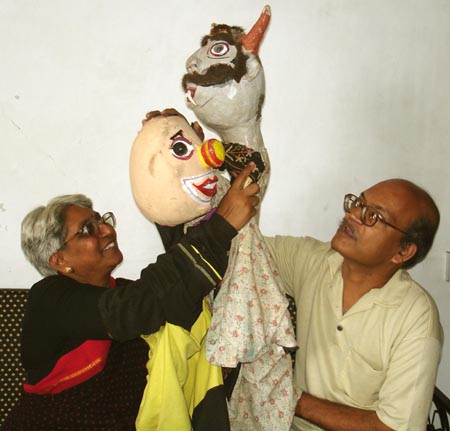Jan 12, 2026
Jan 12, 2026
Hemant (54) and Ranjana (53) Kanitkar take their puppets very seriously. For the past 25 years, they have worked long and hard to establish puppetry as an effective tool to reach out to people - especially in rural India, where the art is very popular.

To explore this link between folk puppet theatre and social issues, they set up People's Universal Popular Puppetry Educational Theatre (PUPPET) in 1982.
Puppetry is both a lifelong passion and a family heritage for Hemant Kanitkar. "I learnt puppetry from my father, Vasant Kanitkar, who started the puppetry department at the State Institute of Education here in Pune. But he had to leave his government job for personal reasons in the late 1960s. To sustain the family, he organized us into a group and we conducted puppet shows in schools and other avenues. Those days, the entire family used to perform together."
The family tided over those difficult times, but Hemant continued to be fascinated with puppetry. He and his wife, Ranjana - a social activist - decided to use puppetry as a means of social awakening. "A fellowship I received from Mumbai University in 1979 - appealing to youth to use various art forms for spreading social awareness in rural India - was a major impetus for this. Around this time, I met Ranjana and we both decided to dedicate our life to social messaging through puppetry. That is how we set up PUPPET," explains Hemant. He also has a firm background in theatre, having trained under Ebrahim Alkazi, Sivaram Karanth and Meher Contractor while studying at the National School of Drama.
Since the early 1980s, PUPPET has been performing across the country, mostly for NGOs and government agencies in the rural areas, on a range of social issues - like child marriage, health of women, alcoholism, safe sex etc - helping them disseminate their message better. Hemant believes that their performances help increase the involvement of communities in the development process.
Hemant and Ranjana recall their first performance in a village in Rajasthan. "This was in 1982. We were performing on the evils of child marriages, when some of the villagers came and threatened to burn our tents if we continued with our performance. We had to beat a hasty retreat," recalls Ranjana.
Looking back at their quarter-century of working on these issues, Ranjana says, "We have learnt that direct messages do not work that well. For instance, when we present the evils of child marriage now, we don't say outright that it is bad. We just present the effect it will have on the girl and the problems she will have to face. This non-didactic approach works better."
Commenting on the challenges they have had to face, Ranjana says, "Fund raising is a big issue. Most of our aid comes from foreign institutions rather than Indian. There is a perception in India that puppetry is only for entertainment - a view that's gradually changing in the cities now." Currently, PUPPET receives funding from the British High Commission and the Sir Ratan Tata Trust.
Their 19-year-old son Yogendra's explanation sums up the situation. Studying to become an environmental engineer, the young man has also received a National Award for Puppetry from the Government of India. He says, "I love puppetry, but I am never going to take it up as a profession. I have seen my parents struggle in the last 25 years. When we have funds, everything is nice, but there are times when we are forced to walk for want of money for transport."
The Kanitkars also run a puppetry training centre in Karjat, a small town between Mumbai and Pune. They are, in fact, shifting base to Karjat. The training module is of eight to ten days, where they teach puppet-making, the different types of puppets, and how to develop a script depending on the message one wants to send across. Many-a-time, NGOs send students across because the Kanitkars perform only in Marathi and Hindi and are unable to perform in other languages.
Of late, on Ranjana's initiative, the Kanitkars have begun using puppetry as therapy for those affected by cerebral palsy. "The puppet is like a mirror. It doesn't have a real soul, but it can bring out and reflect aspects of your personality. Our experience is that puppetry brings out the imagination of dyslexic and spastic persons," explains Yogendra. Essentially, they have been designing special puppetry exercises, which integrate standard physiotherapy exercises as well - only, the puppetry exercises are also fun and engaging.
Another innovative project they have started is on the psychological rehabilitation of disabled soldiers by training them to use and make puppets - as therapy, for creative satisfaction, and also as a means to generate income.
The Kanitkars have also started training the Bharur singers of Maharashtra. Bharur singers, traditional folk artists, move from village to village singing praises of God. PUPPET is training them to include songs about social issues in their repertoire. So far, they have trained 72 groups, of which one has traveled to Mauritius and Australia as part of a government cultural exchange initiative. Since these singers understand the local dialects better, and the rural folk accept them as one of their own, it is easier for them to spread the message, say the Kanitkars.
Hemant and Ranjana, meanwhile, are happy to let their puppets speak for them.
03-Jun-2006
More by : Gagandeep Kaur